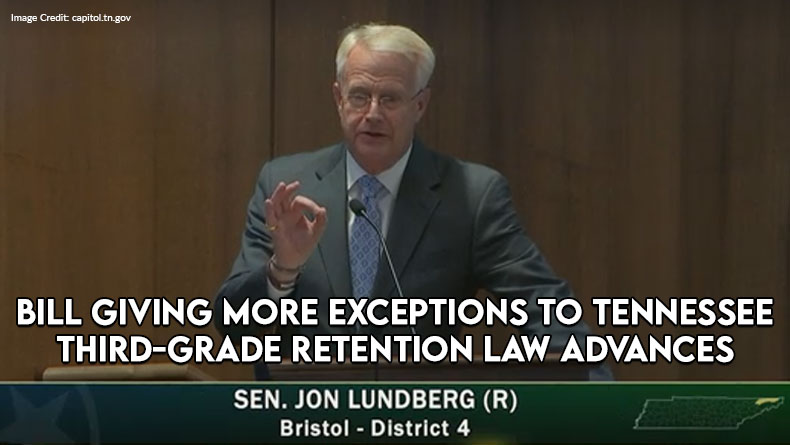Image Credit: capitol.tn.gov
The Center Square [By Jon Styf] –
A Tennessee Senate committee passed a change to the state’s third-grade retention law and it now heads to the full Senate.
The bill would amend a law originally passed in 2011 set to first be implemented at the end of this school year where students must show proficiency in order to advance to the fourth grade.
The proficiency is based on a student’s Tennessee Comprehensive Assessment Program test results. Up to one-third of the state’s third graders might not qualify to advance, though the numbers are not certain until this year’s results are available May 19.

There are several exceptions to the rule for students with disabilities, students who have previously been retained and students with English as a second language. Students can also take a summer reading bridge camp – where they must have 90% attendance – and maintain a state-funded tutor during fourth grade to advance. Students can also re-take the TCAP test to advance.
Senate Bill 300 would allow a second state test to be used for students who are not deemed proficient by the TCAP results. If the student is in the 50th percentile or higher on that test, and are rated as “approaching” proficiency on TCAP, the student could advance on that basis. The companion bill, House Bill 437, was scheduled to be addressed in Finance, Ways and Means Committee on Wednesday.
“I think it’s unacceptable that we have 67% of our kids who cannot read at grade level at third grade,” said Rep Jon Lundberg, R-Bristol, the bill sponsor. “That was our attempt last year. We had a lot of pushback.”
Lundberg told the Senate Finance, Ways and Means Committee the amendment allows for the second test to be taken into account. it allows schools to assist parents if they want to appeal the retention decision, and it allows for additional state funding for tutoring.
Lundberg said he has received plenty of feedback on the law, including hearing from teachers who believe half of their students could be held back.
“That is a problem, but it’s a problem at the school level,” Lundberg said.

Sen. Jeff Yarbro, D-Nashville, proposed an amendment that would delay the implementation of the new amendments by a year.
“I think this is going to be wildly disruptive to students across the state and to school systems across the state,” Yarbro said.
The amendment was tabled by the committee.
“I know districts across the state have been paying attention to this,” Yarbro said. “The people who have not been paying attention to this as much are all of the families whose lives are gonna be effected.”


About the Author: Jon Styf, The Center Square Staff Reporter – Jon Styf is an award-winning editor and reporter who has worked in Illinois, Texas, Wisconsin, Florida and Michigan in local newsrooms over the past 20 years, working for Shaw Media, Hearst and several other companies. Follow Jon on Twitter @JonStyf.




One Response
Teachers and Administrators have had ample time to prepare for this. If we are to keep adding exemptions, we might as well keep raising dummies and throw out the law. The attitude seems to be the usual, make exception to the law and throw more money at the problem.